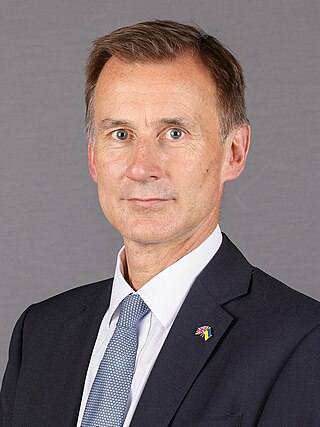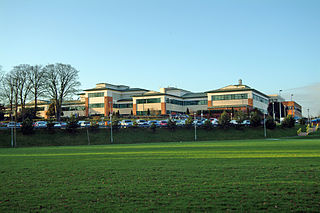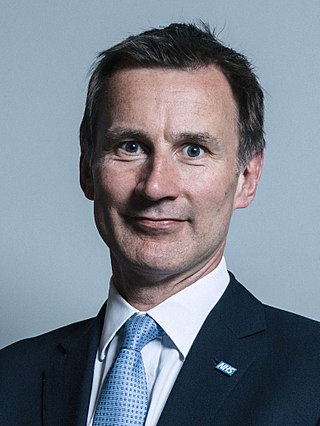
The Hillsborough disaster was a fatal crowd crush at a football match at Hillsborough Stadium in Sheffield, South Yorkshire, England, on 15 April 1989. It occurred during an FA Cup semi-final between Liverpool and Nottingham Forest in the two standing-only central pens within the Leppings Lane stand allocated to Liverpool supporters. Shortly before kick-off, police match commander David Duckenfield ordered exit gate C to be opened in an attempt to ease crowding, which led to an influx of supporters entering the pens. This resulted in overcrowding of those pens and the fatal crush; with a total of 97 fatalities and 766 injuries, the disaster is the deadliest in British sporting history. Ninety-four people died on the day; another person died in hospital days later, and another died in 1993. In July 2021, a coroner ruled that Andrew Devine, who died 32 years later, after suffering severe and irreversible brain damage on the day, was the 97th victim. The match was abandoned and restaged at Old Trafford in Manchester on 7 May 1989; Liverpool won and went on to win that season's FA Cup.

Stephen James Dorrell is a British Liberal Democrat politician. He served as the Conservative Member of Parliament (MP) for Loughborough between 1979 and 1997 and then for Charnwood from 1997 to 2015.

Andrew Murray Burnham is a British politician who has served as Mayor of Greater Manchester since 2017. He served in Gordon Brown's Cabinet as Chief Secretary to the Treasury from 2007 to 2008, Culture Secretary from 2008 to 2009 and Health Secretary from 2009 to 2010. A member of the Labour Party, Burnham identifies as a socialist and as belonging to the party's soft left. He served as Shadow Home Secretary from 2015 to 2016 and was Member of Parliament (MP) for Leigh from 2001 to 2017.

Andrew David Lansley, Baron Lansley, is a British Conservative politician who previously served as Secretary of State for Health and Leader of the House of Commons. He was Member of Parliament (MP) for South Cambridgeshire from 1997 to 2015.
Kelvin Calder MacKenzie is an English media executive and a former newspaper editor. He became editor of The Sun in 1981, by which time the publication was established as Britain's largest circulation newspaper. After leaving The Sun in 1994, he was appointed to executive roles in satellite television and other broadcasting outlets, as well as being involved in a number of publishing enterprises.

Jeremy Richard Streynsham Hunt is a British politician serving as Chancellor of the Exchequer since 2022. He previously served in the Cabinet as Secretary of State for Culture, Olympics, Media and Sport from 2010 to 2012, Secretary of State for Health and Social Care from 2012 to 2018 and Foreign Secretary from 2018 to 2019. A member of the Conservative Party, he has been Member of Parliament (MP) for South West Surrey since 2005.
Liverpool Women's NHS Foundation Trust runs Liverpool Women's Hospital, a major obstetrics, gynaecology and neonatology research hospital in Liverpool, England. It is one of several specialist hospitals located within the Liverpool City Region; alongside Alder Hey Children's Hospital, Liverpool Heart and Chest Hospital, the Walton Centre, Mersey Regional Burns and Plastic Surgery Unit, and Clatterbridge Cancer Centre.

Matthew John David Hancock is a British politician who served as Minister for the Cabinet Office and Paymaster General from 2015 to 2016, Secretary of State for Digital, Culture, Media and Sport from January to July 2018, and Secretary of State for Health and Social Care from 2018 to 2021. He has been Member of Parliament (MP) for West Suffolk since 2010. He is a member of the Conservative Party, but now sits in the House of Commons as an independent, having had the whip suspended since November 2022.
The Liverpool Care Pathway for the Dying Patient (LCP) was a care pathway in the United Kingdom covering palliative care options for patients in the final days or hours of life. It was developed to help doctors and nurses provide quality end-of-life care, to transfer quality end-of-life care from the hospice to hospital setting. The LCP is no longer in routine use after public concerns regarding its nature. Alternative methodologies for Advance care planning are now in place to ensure patients are able to have dignity in their final hours of life. Hospitals were also provided cash incentives to achieve targets for the number of patients placed on the LCP.
The Care Quality Commission (CQC) is an executive non-departmental public body of the Department of Health and Social Care of the United Kingdom. It was established in 2009 to regulate and inspect health and social care providers in England.

The Stafford Hospital scandal concerns poor care and high mortality rates amongst patients at the Stafford Hospital, Stafford, England, during the first decade of the 21st century. The hospital was run by the Mid Staffordshire NHS Foundation Trust, and supervised by the West Midlands Strategic Health Authority. It has been renamed County Hospital. The scandal also resulted in the resignation of NHS Chief Sir David Nicholson in 2013.

Paul Andrew Nuttall is a British politician who served as Leader of the UK Independence Party (UKIP) from 2016 to 2017. He was elected to the European Parliament in 2009 as a UK Independence Party (UKIP) candidate, and served as a Member of the European Parliament (MEP) for North West England between 2009 and 2019, sitting in the Europe of Freedom and Direct Democracy group. He left UKIP in December 2018, criticising the party's association with far-right activist Tommy Robinson, and joined The Brexit Party in 2019.
Max Pemberton is a British medical doctor, journalist and author. He works full-time as a psychiatrist in the National Health Service (NHS). He is a weekly columnist for the Daily Mail, writing comment on news events concerning culture, social and ethical issues, the politics of health care and the NHS. Before his move to the Daily Mail, he was a columnist for the Daily Telegraph. He also writes a monthly column for Reader’s Digest and is a regular contributor to The Spectator. He is the editor of Spectator Health, a quarterly supplement from The Spectator.

The Furness General Hospital scandal involves an investigation by Cumbria Constabulary and other government and public bodies into the deaths of several mothers and newborn babies, during the 2000s at Furness General Hospital (FGH) in Barrow-in-Furness, Cumbria, England. Cases date back to 2004, with a number of major incidents occurring in 2008. The death of Joshua Titcombe and a suppressed report by the Morecambe Bay NHS Trust brought the spotlight onto FGH in 2011 when investigations began. Claims of medical records being intentionally destroyed alongside the discovery of major wrongdoing on behalf of midwives led to threats of closure to the maternity ward.
Circle Health Group is a private healthcare provider in the United Kingdom, and is the country's biggest private hospital provider. The company was founded in 2004 and rebranded as Circle Health Group in 2019 after acquiring a rival, BMI Healthcare; in the same year it began an expansion in China. In 2023 the company was acquired by an Abu Dhabi-based holding company called PureHealth.
North Cumbria University Hospitals NHS Trust was created in April 2001 by merging Carlisle Hospitals NHS Trust and West Cumbria Healthcare NHS Trust. It ran Cumberland Infirmary in Carlisle, Cumbria, the birthing unit at Penrith Hospital and West Cumberland Hospital in Whitehaven, England. In January 2012, the Trust decided that its preferred future was as part of Northumbria Healthcare NHS Foundation Trust but in 2018 it proposed to merge with Cumbria Partnership NHS Foundation Trust. The merger took place in October 2019. The new organisation is called North Cumbria Integrated Care NHS Foundation Trust.
SSP Health is the largest provider of primary care GP services in the North West of England. As of 2014 it was one of only three such organisations in England serving more than 140,000 patients.
Sir David Nigel Dalton is the interim chief executive of Liverpool University Hospitals NHS Foundation Trust and previously Salford Royal NHS Foundation Trust and Pennine Acute Hospitals NHS Trust in northern England. In April 2016, he was appointed as Chief Executive of Pennine Acute Hospitals NHS Trust, in addition to his role as Chief Executive of Salford Royal NHS Foundation Trust, a post he held since 2001. He stepped down from the roles in March 2019, around the time that management of both trusts was combined under the Northern Care Alliance NHS Group.
Healthcare in Liverpool reflects the unique historical legacy of the port. The city had five of the most deprived areas in the country in 2012 according to a Church Urban Fund report. According to Mayor Joe Anderson, "The people in Calderstones, Woolton, and Childwall outlive the people in other areas of Liverpool, like parts of north Liverpool, by 10 to 12 years or so".

Jeremy Hunt served as Secretary of State for Health, later Secretary of State for Health and Social Care, from 2012 to 2018. Appointed by David Cameron, Hunt served in the Cameron–Clegg coalition and Cameron majority government. He was reappointed by Theresa May and served in the majority and minority May governments. In January 2018, Hunt gained additional responsibility for social care in England and, in June, became the longest-serving Health Secretary in British political history. He left the role when he was promoted to Foreign Secretary following the resignation of Boris Johnson, and was succeeded by Matt Hancock.










